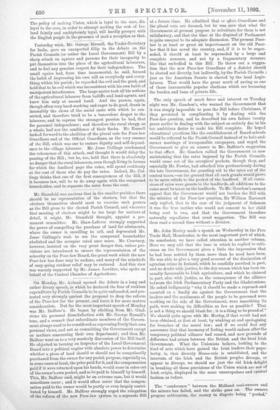Mr. John Morley made a speech on Wednesday in the
Free Trade Hall, Manchester, to the most important part of which, its conclusion, we have called attention in another column. Here we may add that the tone in which he replied to criti- cisms on the Government gives a little the impression that he had been nettled by them more than he need have been. He was able to give a very good account of the diminution of agrarian crime in Ireland, which he eandidly ascribed in part, and no doubt with justice, to the dry season which has been un- usually favourable to Irish agriculture, and which he claimed in part, also with justice, as the consequence of the alliance between the Irish Parliamentary Party and the Gladstonians. He asked indignantly "why it should be made a reproach and counted as a deadly sin against the Government that the leaders and the sentiments of the people to be governed were working on the side of the Government, were smoothing its path, were making its difficulties as few as possible ? That is not a thing we should blush for ; it is a thing to be proud of." We should quite agree with Mr. Morley, if that result had not been obtained, at first at least, by winking at and apologising for breaches of the moral law; and if we could feel any assurance that that harmony of feeling would endure after the temporary political alliance had ceased, and new grounds of difference had arisen between the British and the local Irish Government. What the Unionists believe, looking to the kind of acts which have gained the Irish leaders their popu- larity, is, that directly Home-rule is established, and the interests. of the Irish and the British peoples diverge, or appear to diverge, we should see just the old Irish delight in breaking all those provisions of the Union which are not of Irish origin, displayed in the same unscrupulous and cynical fashion as before.






































 Previous page
Previous page